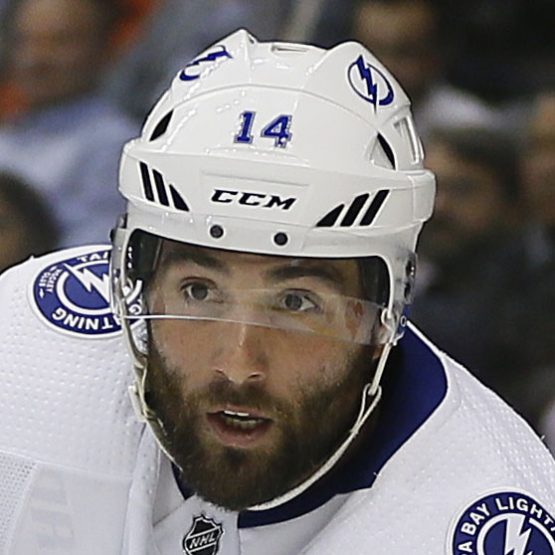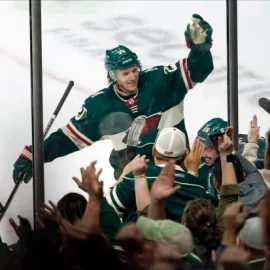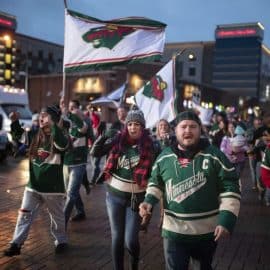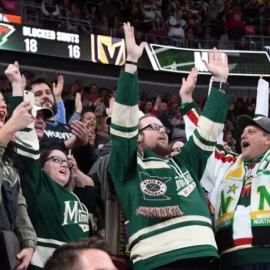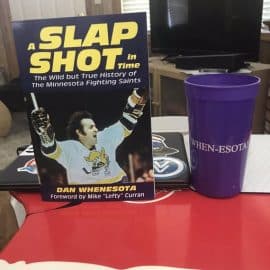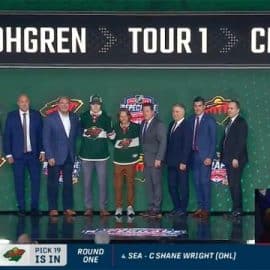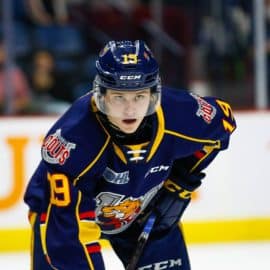Its been a long road back to home. For myself, it was nearly 600 miles of driving for two days after a nice fishing trip to the northern part of Rainy Lake. The weather was fairly hot, the lake incredibly calm and the fishing more of a challenge than normal but one thing you learn is that with each cast of your line you can be in for a dramatic change. A quick little tug on the line can become a fight to pull in a nice Walleye, Northern Pike, or Smallmouth Bass. Its exciting as you’re sometimes you are unsure of what you caught. As you pull your line towards the surface you catch that first dim glimpse of your quarry and the fulfillment of those minutes of boredom become all worth it. Even if you can’t keep the fish, its still the fun of bringing something into the boat. At least that is how it should be, right? After going out for some terrific walleye fishing I returned to my cabin to the news that the Wild managed the incredible feat of signing this summer’s two most coveted unrestricted free agents in Zach Parise and Ryan Suter. The signing sent shockwaves around the NHL, and apart from the exhilaration from a fanbase that was hoping for some great news this summer but the deal also had other ripple effects across the state of hockey, the NHL and the sporting landscape in general.

One of the things I normally do as I depart from my parents’ home (almost always on a Sunday morning) is listen to Sports Huddle with Dave Mona and Sid Hartman on 830AM WCCO. Hartman is not a hockey guy, but with such a big deal taking place it was impossible for him and his co-host not to talk about it. The Wild’s move not only brought up questions about what this means to the team, but how it reflects on the other major sports franchises in Minnesota. Questions like, “why don’t the (insert team here) make a move like the Wild did?” I could see that the acquisition of this former member of the North Dakota Fighting Sioux and Badger have really opened up a whole can of worms probably no one ever thought it would. What exactly were the effects of the signing on the Wild, the NHL and perhaps the sporting world beyond?
Click on “Read More” for the rest of the article…
This will hopefully serve to examine just what the Wild have done, whether intentionally or not with the signing of Zach Parise and Ryan Suter for a pricetag just shy of $200 million dollars in twin 13-year contracts. I will admit some of these questions really got me thinking about how events can lead to others and pretty soon you’ve changed the sporting landscape.
Will Mikko Koivu appreciate the new help?
Short Term effects (for the Wild):
1. The Wild have added offensive depth and speed ~ This should not be a real surprise to anyone as the Wild added a consistent 30-goal scorer in Parise, as well as a defenseman who is good for at least 35 points a season in Suter. Minnesota should get a boost from rookie Mikael Granlund if he can deliver on the hype as being one of the best players outside the NHL is true. Granlund had 20 goals and 51 points in 45 games for HIFK of the Sm-Liiga in 2011-12, he gives the Wild another skilled player on its top 6. This should be seen as a relief to Dany Heatley, Mikko Koivu and Devin Setoguchi who were expected to carry the offensive load by themselves. Suter’s arrival should also take a little pressure off of Tom Gilbert and Marco Scandella to provide offensive punch on the blueline. Minnesota also upgraded its team speed with its signings of Parise, Granlund as well as Torrey Mitchell who may be the fastest player on the team to go along with other speedy players like Setoguchi. This should in theory make the team more able to work the forecheck and make opposing teams pay in transition. The Wild used to be one of the best skating teams in the NHL, with the signing of this year’s group of UFA’s and its incoming youngsters the team should only get even faster the next few years.
2. The Wild have added grit and toughness ~ The Wild did not add speed and skill without addressing the issue of grit. Minnesota re-signed big bodied enforcer Matt Kassian and brought in Zenon Kenopka who is a very tough customer in his own right having led the league in penalty minutes the last two seasons with the New York Islanders and Ottawa Senators respectively. The team also signed Eau Claire-native Jake Dowell who plays a physical, blue collar style of hockey will a willingness to drop the gloves if the situation demands it. Kenopka is not just a goon though, he uses his quick hands to be a beast in the faceoff circle as wins nearly 60% of his draws. That should be very useful on the 4th line. With a team that already features hit-happy forwards Cal Clutterbuck, Darroll Powe, and Kyle Brodziak the Wild should have two lines that will force their opponents to pay a physical price each game. With gritty young forwards Brett Bulmer and Charlie Coyle as well as the big hitting defenseman Matt Dumba the Wild is only going to make the opponents have their keep their collective heads on a swivel hoping they don’t get into the cross hairs of Wild skaters in the next few years.
3. Wild prospects can take their time to develop properly ~ If the Wild had failed in their push to sign Parise and Suter it is quite likely we may have seen an artificial acceleration of the development of its young cache of talent. Throughout the Wild’s history, we’ve seen the team take different approaches to its prospects. Early on the team had a tendency to take its younger players, especially those they drafted in the 1st round, were given time with the big club for a good portion of the season rather than being returned to playing junior hockey. The justification was to give these young players NHL style instruction in practices against other NHL’ers that would hopefully accelerate their development. Even if they got little ice time in NHL games, the thought this was helping players develop faster so they could help the big club. Most Wild fans like myself would say this approach was largely ineffective. Failed prospects like Colton Gillies and James Sheppard give cautionary stories for pushing 18-year old kids into the NHL too fast. With Parise and Suter’s signing the team likely suppressed an urge to try to rush the development of its young players. While the wait may be tough to deal with for some of the Wild’s young players, its a proven method to develop players to their greatest potential. NHL teams like Nashville and Detroit treat each player as individuals and do not put any artificial timelines on a players’ development and when they’re ready they make that advancement to the NHL. The Houston Aeros next season should be a team more or less prospects only. Gone are veteran leaders Jon DiSalvatore and Jeff Taffe leaving the leading roles to be played by Johan Larsson, Jonas Brodin, Charlie Coyle, Zack Phillips, Brett Bulmer, Jason Zucker, and other Wild prospects. By the way, the signings visibility has probably meant the team is going to have a pretty big crowd for its prospect scrimmages this upcoming Thursday and Sunday.
4. Season ticket sales and media publicity has soared ~ It is little secret that in the most immediate sense the news of Parise and Suter’s signing has been very beneficial in season ticket sales. No offense to Mikael Granlund, but the offer of a free Wild jersey with his name and number (#64) on it was hardly enough to get many Wild fans excited about purchasing season tickets. Four consecutive seasons without the playoffs; even after a second summer of making some big splashes personnel-wise really had amounted to a fanbase in a state of general malaise. The fans heard lots of good things about the youngsters and even as they began to sign contracts the general feeling was it would still be a few years before they were ready to begin anchoring the team. Season ticket holders began dumping their seats and I am sure ownership felt additional motivation to make a major splash. There has been an estimated 2,000 season ticket packages sold less than a week and fans have been packing the Hockey Lodge to buy #11 Parise and #20 Suter sweaters. While the team shelled out mega bucks to make this all happen, its already seeing a pretty encouraging return on its investment and they haven’t even played a game for the Wild yet. I am sure Wild beat writer Michael Russo will be happy to relax a bit the next few weeks after being interviewed by just about every NHL-related media outlet from TSN, to NHL Home Ice radio. Also, I don’t see the team dropping ticket prices in the wake of these big signings either, sorry Wild fans.

5. The Wild now have a very realistic possibility at hosting a Winter Classic ~ Every now and then at work I’d get asked when are the Wild going to host a Winter Classic. I used to get annoyed at the question even though on the surface it made a lot of sense. The team is in a traditional hockey market and has cold weather long enough to make it the perfect location to host an outdoor game around New Year’s. A few years ago, a blog called TheOther6seconds.com proposed a Winter Classic to be hosted in Minnesota between the Wild and the Dallas Stars. In the proposal the blogger thought it would a good idea if the Dallas Stars sported Minnesota North Stars uniforms. I immediately gave him a long comment explaining why that would be like inciting a riot (no pun intended Vancouver). I also explained why the Wild at the time (and this was still true until last week Wednesday) were not going to be given a Winter Classic. Besides the fact they were not located in major media market, the team did not have a ‘big name’ roster which you could use to promote the game. Sorry Mikko Koivu, you just don’t have the name recognition necessary for such an event. That has all changed with the signing of two of the top players from the U.S. Olympic team in American-born stars Zach Parise and Ryan Suter. These players have the name recognition that could sell the event both to the league and more importantly NBC, the network host of the event. Ryan Suter could also allow the league to perhaps promote an ‘Olympic’ element to the game which his father Bob who was a member of the 1980 ‘Miracle on Ice’ team that was made primarily of Minnesotans (many of whom still live in the state) and players from in and around Boston, coached by now departed coaching legend Herb Brooks who has a statue near Xcel Energy Center. Since NBC is the network home for the Olympics it seems like a very natural match and something all fans (even the Wild’s opponent) could cheer for. If the NHL agrees to participate in the games in Sochi, this might be nice segue to perhaps announce the members of the U.S. Olympic team as they did a few years ago. Honestly, can you imagine how loud the crowd will be when they announce Parise and Suter to the 2014 Winter Olympic team? That in itself would be an epic moment. The event would also be a major money maker for the Twin Cities; as I would guess it would be held at either Target Field or TCF Bank Stadium and the Wild would gain some much needed national promotion. Wild owner Craig Leipold mentioned the Winter Classic in the team’s official press conference for Parise and Suter on Monday. I’d consider this a done deal more or less, the announcement is simply a matter of time.
Joe Mauer drops the puck between Mikko Koivu and Twin Cities’-native Blake Wheeler in 2010
Short Term effects (Minnesota sports)
1. The rest of Minnesota’s sports teams getting ripped for not pulling off deals like this ~ Minnesota sports fans are often painted as being fickle and cynical. As my father constantly reminds me, only two Minnesota teams have won a championship in the Minnesota Twins and Minnesota Lynx. The Wild’s move has caused fans of these other teams to start asking the $64 question, “why haven’t these teams made a deal like the Wild did?” The question even came up on this Sunday’s Sports Huddle, as a fan asked why the Minnesota Twins sat out of being a big bidder for free agents. While I doubt any Minnesota fan is now suddenly expecting the Twins to throw money around like the New York Yankees, but it does beg the question why they have not been more of a player in attracting ‘big name’ free agents like Albert Pujols or Prince Fielder. Minnesota fans have become used to seeing their star calibre talent that they develop leave for greener (literally and figuratively) pastures. Guys like Kevin Garnett, Johan Santana, David Ortiz, Marian Gaborik have become stories where the respective team either felt compelled to make a trade and cut their losses or just let them walk away as free agents. With the lone exception of the mega deal to lock in Joe Mauer (it should be noted that Mauer and Twins Manager Ron Gardenhire were used in presentation given to Parise and Suter to entice them to come to the Wild); normally top level athletes will have just a limited time in Minnesota before they are claimed by big city teams. The NHL landscape is different from Major League Baseball and the National Football League but when the Timberwolves big splash was landing a player who retired due to knee problems its clear they’re not landing top level talent. Minnesota owners have typically employed excuses of being a ‘small market’ as reasons they only really look at 2nd tier free agents instead of getting involved bidding wars over top level players, which means the only way these teams will ever get a star player is if they draft one. The Parise / Suter deal puts a little heat on the other clubs to stop making excuses for mediocrity and not going after prime time gamebreakers in their respective sport. Speaking of heat, its already started to even show up in the media as Minnesota Timberwolves’ star Kevin Love made public comments that if the Timberwolves don’t managed to make the playoffs next season or if he doesn’t see the team make some significant moves he’d like to be traded. Ouch! For those fans that are sick and tired of ‘cheap ownership’ they’re asking those GM’s to stop giving excuses and pony up the $$ to bring in marquee talent.
Long Term Effects (NHL)
1. Small market, what small market? ~ The Wild spending to just $1.3 million underneath the current salary cap of $70.2 million should erase any stereotypes that small markets can’t be big spenders. The Wild’s move will likely be a major example used by the NHLPA in the current Collective Bargaining Agreement negotiations, but I think this should eliminate the idea that teams in small markets can only spend to a nominal level in relation to the salary cap ceiling. I hope fans in Columbus, Carolina, Nashville, Edmonton, and St. Louis are listening. Is your team not spending closer to the ceiling, look at your ownership because its not impossible. A big reason the move made such news in the ‘hockey world’ was the fact it was made by a team in a small market as most sports fans have become used to seeing big market clubs land the big name players. What this proves is that you can be bold in a small market and while it won’t guarantee they will win all the bidding wars for big time talent, it does show that the market itself doesn’t necessarily eliminate the possibility of bidding big money to lure in marquee talent.

2. The Wild are a major NHLPA bargaining point to keep the CBA as is ~ There is a major source of irony that it was Craig Leipold and the Wild that spent nearly $200 million just two players, since it was Leipold who was one of the most vocal advocates for a salary cap to try to bring about ‘cost certainty’ to the NHL that resulted in the ‘Lockout’ of 2004-05. Leipold, then the owner of the Nashville Predators was growing concerned over the steadily rising costs of player salaries and the disparity of money being spent between big market teams and smaller market teams. The chasm was pretty wide, as I remember teams like the New York Rangers spending over a $100 million on player salaries while the Wild was spending a little over $24 million total. Currently, the chasm between big spenders and those hanging out near the floor make up for an impressive disparity. Just taking a simple perusal of CapGeek.com, the team currently closest to the cap ceiling is the Boston Bruins (the Wild are now #2 in player salaries) with $69.9 million committed to 23 players while the team with the lowest commitment, is Leipold’s former club, Nashville with just over $40 million to 17 players. That’s nearly a $30 million difference. Yahoo!’s Puck Daddy recently published an article about the tricky situation the Wild have inadvertently put the league in which you can read about here. Especially with an owner who openly complained about the again spiraling costs of player salaries just last April it is tough to consider those words he spoke this spring to be pretty hollow. I have little doubt NHLPA’s Executive Director Donald Fehr probably will enjoy the leverage this deal will likely give him in negotiations. Fans like myself cried fowl when the New Jersey Devils offered a 17-year contract to Ilya Kovalchuk as a way to pay a player huge money but get their cap hit down to a reasonable degree. The term of Parise and Suter’s contract obviously was made for the same reason. If Devils were penalized (which still hasn’t really happened yet by the way) shouldn’t the Wild be; and doesn’t this really allow clubs to circumvent the CBA and while the players won’t mind doesn’t it make a mockery of both Leipold’s words and the salary cap itself? So far talks between the two sides have been reported as being both productive and dare I say it, almost friendly. Yet maybe this is an understanding from NHL owners that method of cap circumvention is a ship that has already sailed but until its put under control I think the cap ceiling is only going to increase and the deals are only going to get bigger and bigger. The move clearly implies the Wild believe the status quo will be maintained and listening to Wild General Manager Chuck Fletcher he has mentioned multiple times the salary cap going up by nearly $7 million per season since it was instituted. Does that sound like a GM banking on significant change? I think not.
Long Term Effects (pro sports)
1. Are players’ networking to change the league more than the clubs themselves? ~ I asked this question on Sports Huddle today, bringing up the example of the NBA’s LeBron James and Chris Bosh coming together to sign contracts to join Dwyane Wade and the Miami Heat to become an instant contender. The move resulted in its first NBA championship this spring. Ryan Suter and Zach Parise clearly communicated their interest with one another (even before the opening of free agency if what Parise said on Sports Huddle is true) and it is doubtful that it was an all or nothing situation. The two players wanted to play together and they had similar thoughts on where they wished to play. Luckily for them they found a willing bidder that fit their wants and needs and the deal was done. Yet, it begs the question. Should players be able to leverage teams to signing other players they may not be entirely interested in? Should players be able to have the power to change the competitive dynamic of a professional sports league. While I do not think the Wild will be contending for a Stanley Cup in the next season or two this no doubts puts them on a path to becoming a stronger team in the Western Conference. Should players be allowed to network in this manner or does it come dangerously close to collusion? For Miami and now Minnesota, those fanbases are quite happy with how things turned out. Yet just by reading the comments left on TSN about the deal shows a lot of nastiness and complaints about the fairness of such a situation.
Add The Sports Daily to your Google News Feed!


